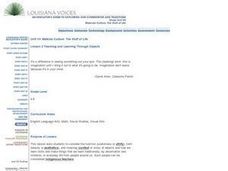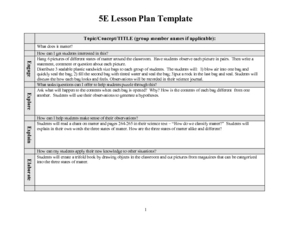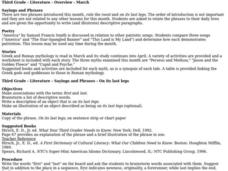Curated OER
3-D Figures Part 1
Elementary schoolers explore 3-D shapes. They transition from thinking of shapes as only 2-D. Pupils read Cinderella as a launching activity for their upcoming adventure, and explore a new world of 3-D shapes in this introductory lesson.
Curated OER
Teaching and Learning Through Objects
Students identify and interpret the function, usefulness or utitlity, form, beauty or aesthetics, and meaning, context or story, of objects and how they learn new skills and make things that they learn traditionally, by observation and...
ReadWriteThink
Teaching Point of View With Two Bad Ants
What better way to explain the concept of point of view than from an ant's perspective! After reading Two Bad Ants, pupils identify the point of view of the ants by studying the text and pictures. Then, they fill out a...
Curated OER
Integers - Objects Model
Sixth and seventh graders solve 19 various types of problems related to integers as objects models. They write an integer that corresponds to each letter on a number line and then, arrange the integers from least to greatest. Pupils also...
Curated OER
Compare 2-D Shapes
Second graders examine the attributes of two-dimensional shapes. In this geometry lesson plan, 2nd graders play a game in order to identify two-dimensional shapes and to name them.
Curated OER
Shape Hunt
Young scholars explore two-dimensional and solid shapes. In this shapes and patterns geometry lesson, students work with a partner to create identifiable objects using tangrams. Young scholars describe the attributes of their shape and...
Curated OER
Catcher in the Rye: Chapters 18-20 Venn Diagram
Well into Catcher in the Rye, when things are looking bleak and your readers may be needing some levity, read the picture book The Perfect Square by Michael Hall. Then use the Venn diagram included to compare how Holden Caulfield and the...
Curated OER
The Five Senses
Study various objects and help kindergarteners use their five senses to classify the objects. They are presented with various objects and then use their five senses to sort and classify the objects. Then they use a Visual Ranking Tool to...
Film English
Paper Is Not Dead
Now that much of people's lives center around their electronic devices, paper is being used less often. However, sometimes you do need paper. Have your class brainstorm the uses of paper and of electronic devices and compare their...
Curated OER
Introduction to Myths, Fables, and Legends
Middle schoolers identify elements of myths, fables, and legends as they read an example of each. After reading an example of each type of story, they list elements from each. They compare and contrast these features by...
Curated OER
From Rags to (Paper) Riches: Explore Colonial Papermaking
Students explore Colonial papermaking. In this Colonial America U.S. history lesson, students analyze two poems written in the 1690s about the Rittenhouse paper mill to learn about papermaking. Students produce their own...
DK Publishing
Big, Bigger, Biggest
Which water creature is the biggest? Youngsters look at an image of a big shell, then draw a bigger shell next to it. They do the same for a big fish. Next, learners practice with the superlative as they circle the biggest duck and frog....
Curated OER
Colonial Silver and Tea
Learners examine silver pieces from colonial Boston in order to determine the social context of these objects. They compare signs of social status in colonial Boston with those of today by looking at the associated visuals.
Curated OER
Pounds and Ounces: It's All About Weight
First graders explore number sense by participating in a measurement estimation activity. In this weight lesson, 1st graders discuss the differences between measurement units, both English and Metric. Students examine a loaf of bread to...
Curated OER
What Does It Matter?
Learners match definitions with vocabulary words and learn basic facts about matter. Then, they see how to determine the physical characteristics of matter. They determine the mass, volume, and density of objects using appropriate tools...
Curated OER
Making a Fossilized Egg
Students explore fossils by participating in an in class experiment. In this archaeology instructional activity, students utilize dough and classroom objects to create fossil imprints after hiding the toy/fossil in the dough egg....
Curated OER
Standard Deviation
In this standard deviation worksheet, students solve and complete 10 different types of problems. First, they determine the number of standard deviations an item was from its mean. Then, students draw a model of what this would look...
Curated OER
Wow, Saturn Is Much Bigger Than Earth!
Students compare and contrast the sizes of Earth and Saturn. They create scale illustrations of each planet and label them. They share their models with the class.
Curated OER
Adjectives
In this ESL adjectives worksheet, students analyze 7 pictures that depict objects of different sizes and shapes. Students match these pictures with the adjectives that describe them.
Read Works
Famous Inventors — Zip it Up
Explore the invention of the zipper with a 10-question reading comprehension worksheet that challenges scholars to show what they know about an informational text's details and vocabulary.
Curated OER
In Touch with Apples
Students read "How To Make an Apple Pie and See the World", the story of a girl who traveled the world to find the ingredients to make her apple pie. They conduct a series of interdisciplinary activities including testing their senses,...
Curated OER
Literature
Third graders study phrases, poetry and myths of Ancient Greece and Rome in these lessons.
Curated OER
Functions
In this functions worksheet, students solve and complete 5 different sets of problems that include determining functions on intervals. First, they define a definite integral and the Fundamental Theorem of Calculus. Then, students draw a...
Curated OER
The Mystery of the Missing Hummingbirds
Students record scientific observations in a science journal. In this season lesson, students make observations about each of the seasons and record in their journals. Students record organisms response to seasonal changes...























